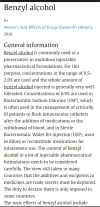bryan_usa
Member
I noticed that QSC's bacteriostatic (BAC) water is listed at 0.8% Benzyl Alcohol rather than the usual 0.9% Benzyl Alcohol. Do you think that matters when reconstituting things like HCG, peptides or tirzepatide? I'm guessing the only issue is whether that's enough BA to kill bacteria in the vial long term, correct?


